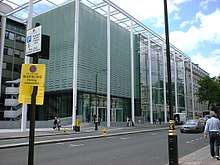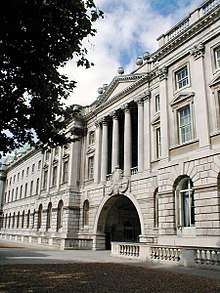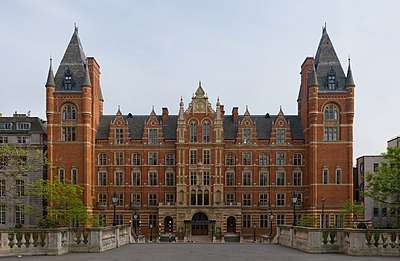Education in London
London is a leading global educational centre, having one of the largest populations of overseas students of any city in the world.

Universities
London has the largest student population of any British city, although not the highest per capita. Universities in London may be divided into two groups:
First, the federal University of London, which, with over 120,000 students, is the largest contact teaching university in the United Kingdom (smaller only than the distance-education Open University) and one of the largest Universities in Europe. It comprises 19 colleges and 12 institutes, as well as a distance-learning External System.[1] Constituent colleges have a high degree of autonomy, controlling their own admissions and degree programmes, and are effectively universities in their own right. The largest and most well-known University of London colleges include (in order of student population size) King's College London, University College London, Birkbeck, Queen Mary, the London School of Economics and Political Science, Royal Holloway, Goldsmiths, and the Institute of Education. Smaller schools and institutes (with fewer than 5,000 students) include the School of Oriental and African Studies (SOAS), the London Business School, the School of Pharmacy, the London School of Hygiene and Tropical Medicine, St. George's Hospital Medical School and Central School of Speech and Drama. Traditionally all of the University of London institutions awarded degrees from the University of London itself, and not from the individual college or institution, but this changed in 2007/2008 when King's College London, the London School of Economics, University College London and the Institute of Education remained within the University of London system, but began awarding their own degrees.[2] Imperial College London was a part of the University of London until 2007, but is now a separate institution.
Secondly, there are other universities not part of the University of London, most of which were polytechnics until UK polytechnics were granted university status by a 1992 Act of Parliament. Among these are the University of Westminster, London South Bank University, University of Greenwich, City University, London, Middlesex University, London Metropolitan University, Brunel University, University of West London, the University of East London, and various other higher education institutions.
Research
Imperial College London, King's College London, LSE and UCL are leading centres of research and stand alongside MIT, Berkeley, Princeton, Yale and other US universities in terms of international reputation.[3][4]
Most of the leading British learned societies are based in London. The Royal Institution is a historic and important repository and proponent of the acquisition of scientific knowledge through research and study.
Other institutions of higher education
There are also a number of firms and colleges in London which provide education and consultation leading to degrees validated by universities, but which are not actual universities themselves. Some of these colleges are private institutions very similar to actual universities, such as European Business School, Aspley Business School London, London School of Business and Management and Regents University.
Further education
London also has many further education colleges funded by the Learning and Skills Council. Traditionally these were clearly separated from the higher education system, and offered vocational education below university level, but this distinction is breaking down and many further education colleges now offer university level courses validated by a local university and prepare students for university entrance, as well as providing vocational courses.
Arts education
London is Britain's leading centre for arts education. London's four music conservatories are the Royal College of Music, the Royal Academy of Music, Trinity College of Music, and the Guildhall School of Music and Drama. Other drama schools include Royal Academy of Dramatic Arts ("RADA"), and the Central School of Speech and Drama. Art & Design schools include Central Saint Martins College of Art and Design, Chelsea College of Art and Design, Camberwell College of Arts, Wimbledon School of Art and London College of Communication and London College of Fashion (all part of the University of the Arts London), and Goldsmiths College, University of London and the Slade School of Art (both part of the University of London), and The Design School (part of Kingston University ) and the Royal College of Art. The former Hornsey College of Art is now part of Middlesex University. The University of East London has an Institute for Performing Arts Development – IPAD.
Medical education
London is an important centre of medical education. The city's medical schools are attached to the leading hospitals and some of them are several centuries old. The number of schools has been reduced to five by a recent series of mergers:
- Barts and The London School of Medicine and Dentistry
- King's College London School of Medicine and Dentistry (formerly Guy's, King's and St Thomas' School of Medicine)
- Imperial College School of Medicine
- University College London Medical School
- St George's Hospital Medical School
Multiculturalism
London is known as a city that is diverse, populated by peoples and cultures from many other parts of the globe. Many London schools require the teaching of foreign language.
Schools
Public schools in Greater London include Harrow, City of London School, University College School, Westminster, Highgate School, Merchant Taylors' School and St Paul's School.
International schools include The American School in London, German School London, the Japanese School in London, and the Lycée Français Charles de Gaulle (French school). The London Japanese school, in addition to its day school, also has a weekend programme serving students in the Japanese community in the United Kingdom who attend British and international schools.
Student housing
The low quality of the dormitories offered by schools themselves, the shortage of student housing, and the relatively good economic resources of the international students who attend schools in London offered an economic opportunity to firms such as Unite Students which have built thousands of units of student housing in London.[5]
References
- "University of London Colleges and Institutes". Archived from the original on 22 May 2011. Retrieved 19 February 2008.
- UCL FAQ on degree-awarding powers Archived 12 August 2007 at the Wayback Machine
- Times Higher Education International University League Table
- Times Higher Education Social Science International University League Table, showing LSE in its specialist area
- Jenny Anderson (12 May 2015). "London Real Estate Sizzles Off Campus". The New York Times. Retrieved 13 May 2015.
International college students are pouring into London, deepening an extensive housing shortage. The result is that student housing is becoming another red-hot corner of the city's property market




.jpg)